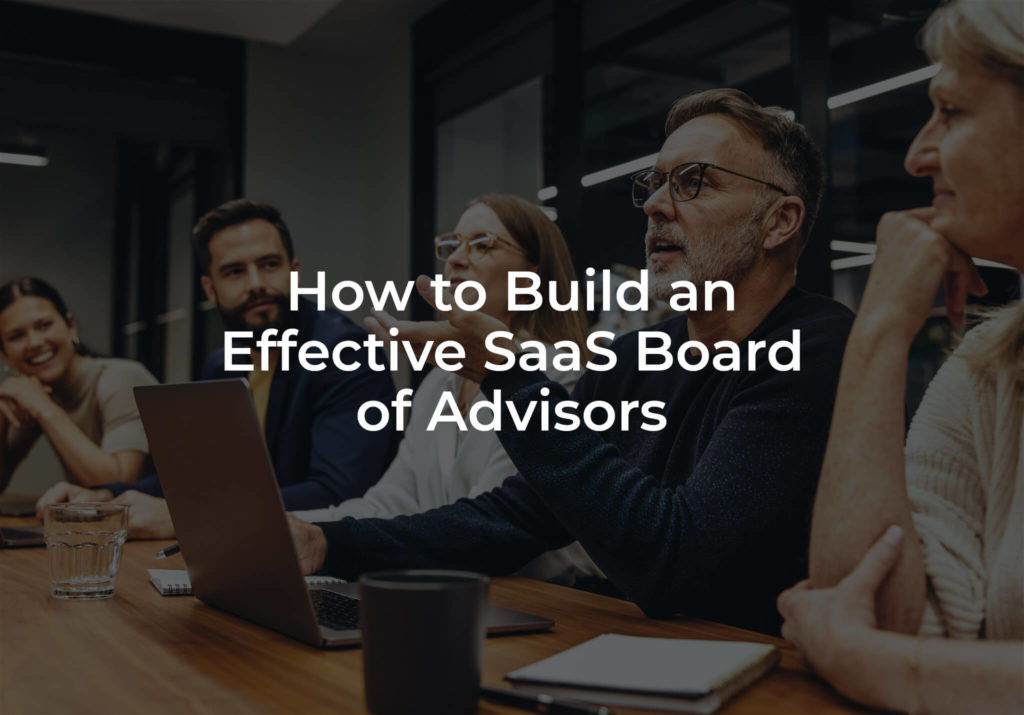SaaS Board of Advisors. It sounds like a high-level executive position, doesn’t it? But if you’re a startup founder, building an effective board of advisors should be one of your early priorities. A board of advisors can help you assess and mitigate risk, connect with new partners and customers, and raise capital more efficiently. So how do you go about putting together a board that will be beneficial to your company?
Keep reading…
What you might have missed
While all businesses can benefit from having advisors, needs change as the business grows and evolves. A startup or small business without a human resources department, a finance/accounting department, or a legal department can benefit by consulting with expert advisors in those fields. A large business, even one with dedicated departments and teams, might be considering large scale problems, such as the best strategies for entering a new, unfamiliar industry or how best to incorporate a new line of products while simultaneously managing existing resources.
SaaS, software, and technology businesses often have both startup growing pains (e.g. handling new employees, vendor contracts, local business permits, etc.) and typical large business problems (e.g. launching an online service and immediately entering multiple markets nationally and/or worldwide, data management and privacy compliance with regulatory bodies in the U.S. and worldwide, security breaches, growing an intellectual property portfolio, rolling out new technologies without clear regulations or under new regulations, managing income in multiple currencies, handling export controls such as EAR and ITAR, etc.).
Many of these problems catch entrepreneurs and SaaS engineers by surprise. Having trusted and experienced advisors to rely upon can be invaluable in helping you and your SaaS business traverse these unfamiliar paths.
In this article, we discuss how selecting the best board of advisors possible can counsel you when making your most difficult decisions, exploring new opportunities, and avoiding pitfalls and blind spots.
What is a SaaS Board of Advisors?
A board of advisors is a group of people who provide strategic advise that can increase the performance of your management team. Generally, these advisors will be experienced business professionals and subject-matter experts with a high degree of skill, know-how, and connections that your management team may not otherwise possess. A board of advisors can assist in the development of business plans and strategies, introduce you to potential investors and otherwise inaccessible customers, identify needs and acquire expert talent to cover those needs, and generally act as a sounding board on all manner of topics.
Board of Directors vs. Board of Advisors
Directors, along with officers, managers, and member-managers are individuals who, by the nature of their roles, owe a fiduciary duty to your business. Advisors do not owe a fiduciary duty to your business.
To show the differences between directors and advisors, let’s briefly talk about business structures. Other than doing business as a sole proprietor, the types of business structures available will generally depend on the laws of the State in which you are creating or registering your business. For example, the Division of Corporations of the Florida Department of State allows the incorporation of for-Profit and Non-Profit Corporations, the organization of Limited Liability Companies, the registration of Partnerships, and the qualification of Limited Liability Partnerships.
The Delaware Divisions of Corporations allows the incorporation of Public Benefit Corporations, the creation of Statutory Trusts, the organization of Limited Liability Companies, and the formation of Registered Series Limited Liability Companies, to name a few. The business structure of these entities will depend on their type, the applicable State law, and any modifications to the entity’s standard structure (generally applied through changes to the entity’s Articles of Incorporation or Articles of Organization).
With so many possibilities for the structure and governance of business entities, we will focus on two of the most common types of entities: corporations and limited liability companies.
People may have one or more roles in a corporation, including:
- Stockholders/Shareholders – these are the owners of the corporation. While they are not necessarily involved in any of the business operations, they select and vote for the Board of Directors. In many cases, one or more shareholders are also directors and/or officers.
- Board of Directors – the Directors vote on high level decisions, form committees, select officers, review officer performance, and look after the interests of the shareholders.
- Officers – often appointed by the Board of Directors, officers are closer to the business operations and are responsible for the day-to-day operations may include the president and vice-president, the chief executive officer (CEO), the chief financial officer (CFO), and other similar positions.
Similarly, people may have one or more roles in a limited liability companies, including:
- Members – analogous to a corporation’s shareholders, members own membership units (analogous to owning shares or stock in a corporation).
- Managers – analogous to both directors and officers, managers are generally in charge of the day-to-day operations of the company. A company can be member-managed or manager-managed, which is often indicated in the Articles of Organization.
Note that a board of advisors is not part of the corporate governance structure. A company or corporation is not required to have advisors or a board of advisors, and the advisors, if any, do not operate the business and do not have an authority position within the business hierarchy. So, why would a company have a board of advisors?
The Benefits of Having a Strong Board of Advisors
Direct guidance with a better price tag
In balancing the needs of the business (and its shareholders) and the needs of employees (including the officers), fiduciary duties require the board of directors to prioritize the business and its shareholders. A board of advisors can focus on the needs of the CEO and other officers and employees because they do not owe a fiduciary duty to the business.
Furthermore, directors usually receive larger compensation packages when compared to advisors due to the risks and responsibilities involved in becoming a director. Since the board of advisors does not have fiduciary duties, it also does not have liability for mistakes, so there is no need for a Directors & Officers Liability Insurance to cover advisors.
Multiple points of view
Advisors can offer a wide spectrum of backgrounds and experiences, from the rote and technical to the social and cultural. A board of advisors can identify blind spots and problem areas, both internal and external to your business. A board of advisors can also solve problems that might seem insurmountable with an outsider’s objective perspective.
Improve the reputation of your business
A solid board of advisors can improve your credibility when seeking financing from banks or investors, when pitching your products or services to potential clients, and when hiring difficult‑to-find talent. When you fill your board of advisors with tested leaders and proven experts, you signal to banks and investors that you have surrounded yourself with top professionals that can help your business grow. Potential clients are more likely to believe that your company can meet their needs with a board of advisors. Likewise, potential employees and contractors will have confidence that the company is being expertly run and provide them stable employment into the future.
What To Look For In Potential Board Members
First, examine your team and yourself. Determine your team’s strengths and weaknesses. Then, define the type of skills, experience, and know-how that you need in your board of advisors. You and your team are likely to spend a good deal of time interacting with your board of advisors, so keep in mind the following:
Cohesiveness and Rapport
If the board of advisors and your team cannot effectively communicate, you might as well have no advisors. This might seem obvious, but it is often overlooked.
You can let advisors go and bring new ones in
Even if you have great advisors, your business requirements will evolve over time, projects may terminate, and new needs will arise. Let your board of advisors evolve with your business. Good advisors will be sensitive to your needs and support these types of moves as well in supporting your quest for success.
Fill gaps in skills, know-how, and experience
The core function of your board of advisors is to provide advice. Sound advice and actionable guidance requires for your advisors to have the correct background, skills, know-how, and experience to complement you and your team.
SaaS startups are often started by engineers and computer scientists. It might sound counterintuitive but you should consider complementing your team with advisors without technical skills. Advisors who lack of technical skills will often provide a better level of unbiased feedback. For example, an advisor without technical knowledge may inform you when your presentations, your advertisements, or your website are too dense for customers to understand.
How To Find and Recruit Your Board of Advisors
If you have read this far, chances are that you want to pull a board of advisors together. Leverage your network. Start with people you know directly and ask them whether they know anyone who matches the skillset you are looking for in potential advisors and would be a good fit with your company’s culture. Use social networks to expand your search.
Be open minded. If you need to know what customers are thinking, you might want to recruit customers. If you are planning to enter European or Asian markets, seek individuals with experience in those markets.
When engaging potential advisors, keep in mind the type of advisor and skillset you need and convey that need. Manage expectations from the start. Be clear with your expectations, time commitments, contributions, availability, and the like. The potential advisor you interview will also have expectations, so be ready to respond to their requests. If you are reaching out to a highly sought after advisor, someone who is busy, or if your time demands and other commitments are significant, the advisor might expect a certain level of compensation.
How To Compensate Your Board of Advisors
Advisors are often compensated with equity in the company, generally 1%. Of course, this will vary according to the advisor’s experience, role, and value. Advisors with technical knowledge and/or industry experience are sometimes compensated with both cash and equity, or may not be compensated at all.
How To Structure Your Board of Advisors
Bring only the people you need. A board of advisors that is too big might dilute the time the advisors have to express their opinions fully. A dominating advisor might take over and other advisors might feel left out and quit. Note that an odd number of members (for example, 3 or 5) can break ties when voting. Consider appointing a chairperson and/or a moderator. The chairperson will organize meetings, mediate disagreements, and act as the point of contact for the board. A moderator (who is preferably not a board member) can steer conversations in the right direction when they go off-topic and open the floor for shy or introverted advisors.
In SaaS startups, boards of advisors are often composed of investors (particularly those that are not on the board of directors). Keep in mind that the results from the board of advisors are what you make of them. Therefore, bring in advisors that match the needs of your SaaS startup.
Consider the following people for your SaaS advisory board: (1) a person with more experience in the same industry who can challenge your plans, strategies, and designs and help chart realistic expectations; (2) a person with a finance background who can help your team prepare for meetings with investors and develop effective capitalization strategies; and (3) a person with experience taking SaaS services to market who can identify and evaluate key performance indicators, with attention to whether you are a business-to-business and/or business-to-customer SaaS company.
Tips For Working With Your Board
Talk . . . and Listen
Without the right type of communication, the board of advisors will not operate effectively. Have a back and forth dialogue with your advisors. Tell them what you need and what is on your mind and let them respond with their experienced insights and solutions. You are usually not pitching formal proposals to the board of advisors, although you might practice pitching with them. You are also not delivering any formal reports, although you might communicate the status of plans and projects to keep your business operating on track. Keep in mind the purpose of the board of advisors in your business while engaging them.
Too Much Advice
When advisors learn about your business, the situation may arise where the advisors want to buy equity and invest in your business. When the advisors are also a shareholders, the advisors might feel that you have an obligation to heed their advice and may try to exercise influence over your decisions.
Discover their process and learn about them
Is your potential advisor a night owl? Do they tell it straight or use the Socratic method? Ask potential advisors about their prior work experience, their prior advising experience, and the best ways to communicate with them.
Not everything requires a formal meeting
If you need advice regarding a particular issue, just call or send a quick message. Many problems can be addressed without the presence of the entire board. This will also save everyone’s time.
Do not waste their time, Part 1: Prepare
Send an agenda in advance of any meetings. Come prepared, particularly with uncompensated advisors. You do not want these advisors jumping ship due to a perception of disrespect or a disregard for their time and value. Keep in mind that uncompensated advisors are donating their expertise, which they could be charging someone else to provide.
Do not waste their time, Part 2: Focus
Everyone has limited time. When engaging advisors, resolve one issue before advancing to the next. If you have multiple issues to discuss, consider postponing some for the next meeting if necessary.
Creating Board of Advisors Legal Agreements
While the relationship with advisors might be informal, you should still have a Board of Advisor Agreement in place. Here is a short list of topics that should be covered by the Agreement:
- Responsibilities of the Advisor (especially if there will be compensation of any kind)
- Compensation (including explicitly that there will be no compensation if the position is unpaid)
- Information management, privacy, and intellectual property terms
- Confidentiality and duty to not disclose information (including appropriate an definition of confidential information)
- Non-competition
- Non-use of information
- Ownership of intellectual property – Note: If advisors come up with new ideas for products or services and/or if they assist in the development of products or services (a common occurrence in SaaS boards), there is a high risk that they will be considered inventors and/or authors under Patent and/or Copyright law. Consider having an agreement in writing transferring those rights to you or your business.
- Agreement to comply with business policies
- Length of the Agreement and early termination provisions (especially important for compensated advisors)
Looking to Build a Board of Advisors? Speak With an Experienced Startup Attorney
Building a board of advisors is just part of the whole suite of issues that an Experienced SaaS Startup Attorney can help with. Consult an Experienced SaaS Attorney. The Rapacke Law Group is a business and intellectual property law firm built for the speed of startups, with business and patent attorneys experienced in software and SaaS technologies. No hourly building, no charges for calls or emails. We offer startup legal services for a transparent flat fee.
Our experience ranges from initial business formation and planning to the final liquidity event. Our startup lawyers are involved with fast-moving entrepreneurial companies seeking legal counsel in company formation agreements, liability, equity issuance, venture financing, IP asset protection, and infringement resolution and litigation. Contact us to schedule a free consultation with one of our experienced attorneys.



